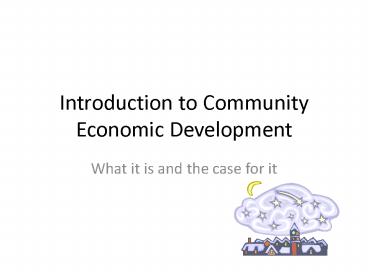Introduction to Community Economic Development - PowerPoint PPT Presentation
1 / 19
Title:
Introduction to Community Economic Development
Description:
Introduction to Community Economic Development What it is and the case for it Community Economic Development a.k.a. Community-based development An approach ... – PowerPoint PPT presentation
Number of Views:576
Avg rating:3.0/5.0
Title: Introduction to Community Economic Development
1
Introduction to Community Economic Development
- What it is and the case for it
2
Community Economic Development
- a.k.a. Community-based development
- An approach emphasizing local self-sufficiency,
local decision-making, and local ownership. - A strategic response that might assist
communities to take up development opportunities
and challenges. (Loxley, 2000)
3
A holistic approach
- It links economic development with a wider
social and economic process.
4
- small scale economic activities
- provision of local needs and demand
- a microeconomic approach
5
- No universally accepted definition of CED
6
United Nations 1955
- A process designed to create conditions of
economic and social progress for the whole
community with its active participation and the
fullest reliance upon the communitys initiative.
7
Conference Board of Canada 1994
- A strategy by which local development
organizations mobilize local resources for a
multi-faceted development campaign.
8
CED in the economic context
- polar opposite of capitalist forms of development
- capitalist development typically brings the
development to a community from the outside - CED promotes development from the inside
9
CED in the economic context
- people in a community are to be the authors,
architects and builders of their development
10
CED in the economic context
- The people of a community may need assistance and
supports in building their communitys future.
11
- What is a community?
12
- What is the case for CED?
13
The concept of the Social Economy is relevant
to CED
14
What is the social economy?
- The social economy is a grass-roots
entrepreneurial, not-for-profit sector, based on
democratic values that seeks to enhance the
social, economic, and environmental conditions of
communities, often with a focus on their
disadvantaged members. - (Human Resources and Social Development Canada)
15
Why is the federal government interested in
social economy enterprises?
- Governments are increasingly turning to
community-based processes and initiatives to
address local problems with local solutions.
16
What are social economy enterprises?
- Social economy enterprises are run like
businesses - Produce goods and services for the market economy
- Manage their operations and redirect their
surpluses in the pursuit of social and community
goals - Often grow out of broad-based community
development strategies
17
What benefits do the social economy bring to
communities?
- It contributes to a range of community goals and
has the potential to create collective wealth
through the production of goods and services.
18
Social economy enterprises provide a flexible
and sustainable tool that can help communities to
achieve their own objectives, such as
- stimulating job creation and skills development
- enhancing community capacity for social supports
- supporting economic growth and neighbourhood
revitalization - protecting the environment
- mobilizing disadvantaged groups.
19
Is the social economy important in other parts of
the world?
- Several of OECD countries have developed
strategies to promote social enterprises. - The European Union includes the social economy in
its entrepreneurship pillar. - The UK launched a strategy with the Department of
Trade and Industry to support the growth of the
social economy (2002).

